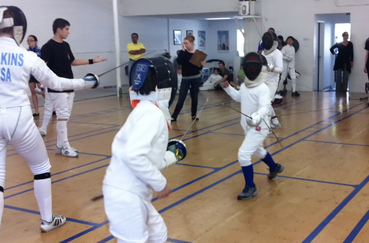|
One of the most confusing things to figure out, once your fencer is ready to compete, is how to find tournaments and how to know which ones to go to. Some children can’t wait to compete and some find the idea of competing intimidating at first. When the conversation turns to when instead of if, it is important that your child start competing at a level that is appropriate. You want to encourage him or her, and fencing against much better or more experienced fencers can be demoralizing, especially at first. Talk to your coach. Talk to your child. Before your child can compete in any tournament, he or she must have a USA Fencing membership. Most clubs have USA Fencing sanctioned tournaments that take part in the USA Fencing insurance program. You will be asked for proof of membership when you arrive at each and every tournament. You will also need a proof of age for your child at a tournament, until you are able to have USA Fencing verify the age, so be sure and have a copy of a birth certificate when you go to tournaments. Individual Competitive Membership costs $75 a year. Here is the link to sign up: This blog will not deal with specifics regarding earning points or qualifying for Summer Nationals or the July Challenge. Please refer to the USA Fencing website, as those specifics change frequently at the beginning of each year. There is a link to the Athlete Handbook at the end of this blog, for further reference. Events and Age Categories: (Y means Youth) Y8 - Fencers age 8 and under (these events are uncommon; usually events start at Y10) Y10 - Fencer age 10 and under, and so on through Y14. Cadet – Fencers age 13 – 16 Junior – Fencers age 13 – 21 Though here I use ages for convenience sake, USA Fencing uses the birth year as a determining factor for the age groups. Refer to the USA Fencing Athlete Handbook for the current birth years for each category. Mixed events mean boys and girls fence together. Basic recommendations for beginner fencers:
For new fencers, local tournaments are the best place to start. Many local clubs have “unrated” tournaments - these are typically tournaments for younger or beginner fencers. Some of the local clubs have a series of tournaments with fencers earning points each time they compete in one of the series. Those points are added together for some kind of prize at the end for the top points winner, typically a medal or trophy. Upcoming regional (and national and international) tournament information can be found on the USAFencing website at this link: Tournaments.
Local tournaments are great for new fencers for a number of reasons. Fencers face a lot of pressure on the strip, even at the beginning level. As your child begins to compete, he or she will learn a lot. He will learn how to win and how to lose. She will learn how to think on the strip and how to keep calm. If you have the option of having one of your coaches from your club come and coach, your fencer will start to learn how to listen and think on the strip. Not all coaches are willing to go to these tournaments, and they will charge a fee, so this is somewhat of a luxury, if even available. You can always ask. Whether at a tournament at this level, or at an RYC or SYC (detailed later in this blog) if your coach attends, your coach will also learn a lot about your child- how he or she deals with pressure and what has (or has not) been learned from all of those classes and private lessons. Once your child has competed in a few local tournaments and has achieved some nice results, talk to your coach about moving up to the next level of competition. Your coach is the best source for questions like this. Another thing to consider is the pressure your young fencer faces. Once you move up to regional tournaments (details in the next section) it will probably involve travel, whether a road trip, or a plane flight. Just the fact that you are disrupting the routine and investing in the travel, packing, etc., puts more pressure on your young fencer. Make sure he or she, and you, are ready. RYCs, SYCs, RJCs, RJCCs, ROCs, and NACs - What they mean and what you need to know. RYC: Regional Youth Circuit USA Fencing has divided the US into six regions. California is in Region 4. This region includes the states of Arizona, California, Colorado, New Mexico, Nevada, and Utah.
Fencers from any region can compete in an SYC tournament. USA Fencing will only take the top result however, regardless of how many times a fencer competes in an SYC. SYCs are more competitive that RYCs and attract fencers from all over the US. RJCC: Regional Junior and Cadet Circuit These are regional tournaments for fencers who are Cadet or Junior aged. Again, the R means regional so make sure you are planning on attending an RJCC in your region. Fencers can earn points for the July Challenge at these events, and they are very competitive. ROC: Regional Open Circuit This is included here, just to give a basic understanding of what a ROC is. These tournaments are open to any fencers over 13 years old. Fencers can qualify to fence in the Division II and Div 1A events at summer nationals with points earned from these tournaments. Only older beginning fencers should attend an ROC as they will be fencing against fencers of all ages who typically have a lot of experience and are very strong. NAC – North American Cup The North American Cup Tournaments are a series of tournaments organized by USA Fencing (Y10, Y12, Y14, Cadet, Junior, Div I, Div II, Div III, Vet Open, Vet Age, Wheelchair, and Cadet/Y14/Junior/Senior Team). NACs rotate through cities across the country. You can find more info on the USA Website.
Summer Nationals All fencers have to qualify for this tournament. Luckily, USA Fencing wants to encourage young fencers to participate, so they have made the path fairly simple. Fencers in Y10 only have to compete in an RYC. Placing first or last, the result is irrelevant. If a fencer participates, he or she has qualified to fence at summer nationals. Take a moment to download the USA Fencing Athlete Handbook for much more detailed information on tournaments. Ready? Fence!
1 Comment
|
Tournament Fencing Needs
Mandatory: Additional Helpful links: USA Fencing National Athlete Ranking - Men's Epee National Athlete Ranking - Women's Epee Regional Points Standings USA Fencing Athlete Handbook SoCal Divison AskFred AuthorKathryn Atwood - Swords Fencing Studio. We welcome any questions and comments, suggestions for topics, etc. Categories
All
Archives
March 2019
USA Fencing Rules Book
|
||||||
Photo from daniel0685

 RSS Feed
RSS Feed
